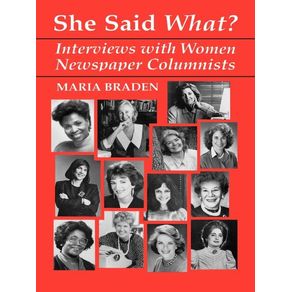No longer relegated to reporting on society happenings or household hints, women columnists have over the past twenty years surged across the boundary separating the "women's" or "lifestyle" sections and into the formerly male bastions of the editorial, financial, medical, and "op-ed" pages. Where men previously controlled the nation's new organizations, were the chief opinion givers, and defined what is newsworthy, many women newspaper columnists are now nationally syndicated and tackle the same subjects as their male counterparts, bringing with them distinctive styles and viewpoints.
Through these frank and lively interviews, Maria Braden explores the lives and work of columnists Erma Bombeck, Jane Brody, Mona Charen, Merlene Davis, Georgie Anne Geyer, Dorothy Gilliam, Ellen Goodman, Molly Ivins, Mary McGrory, Judith ("Miss Manners") Martin, Joyce Maynard, Anna Quindlen, and Jane Bryant Quinn. Pofiles describe how these writers got started, where they get the nerve to tell the world what they think, how they generate ideas for columns, and what it's like to create under the pressure of deadlines. Representative columns illustrate their distinctive voices, and an introductory essay provides a historical overview of women in journalism, including pioneering women columnists Fanny Fern, Dorothy Thompson, and Sylvia Porter.
Braden finds that today's women columnists frequently raise issues or use examples unique to their gender. Because they are likely to have a direct personal connection to current social issues such as abortion, child care, or sexual harassment, they are able to provide fresh perspectives on these provocative topics. In doing so, they are helping to define what is worthy of attention in the '90s and to shape public response.
A unique addition to the literature on women in journalism, this book will interest general readers as well as students of journalism, literature, American studies, and women's studies. Aspiring writers will find here role mo

